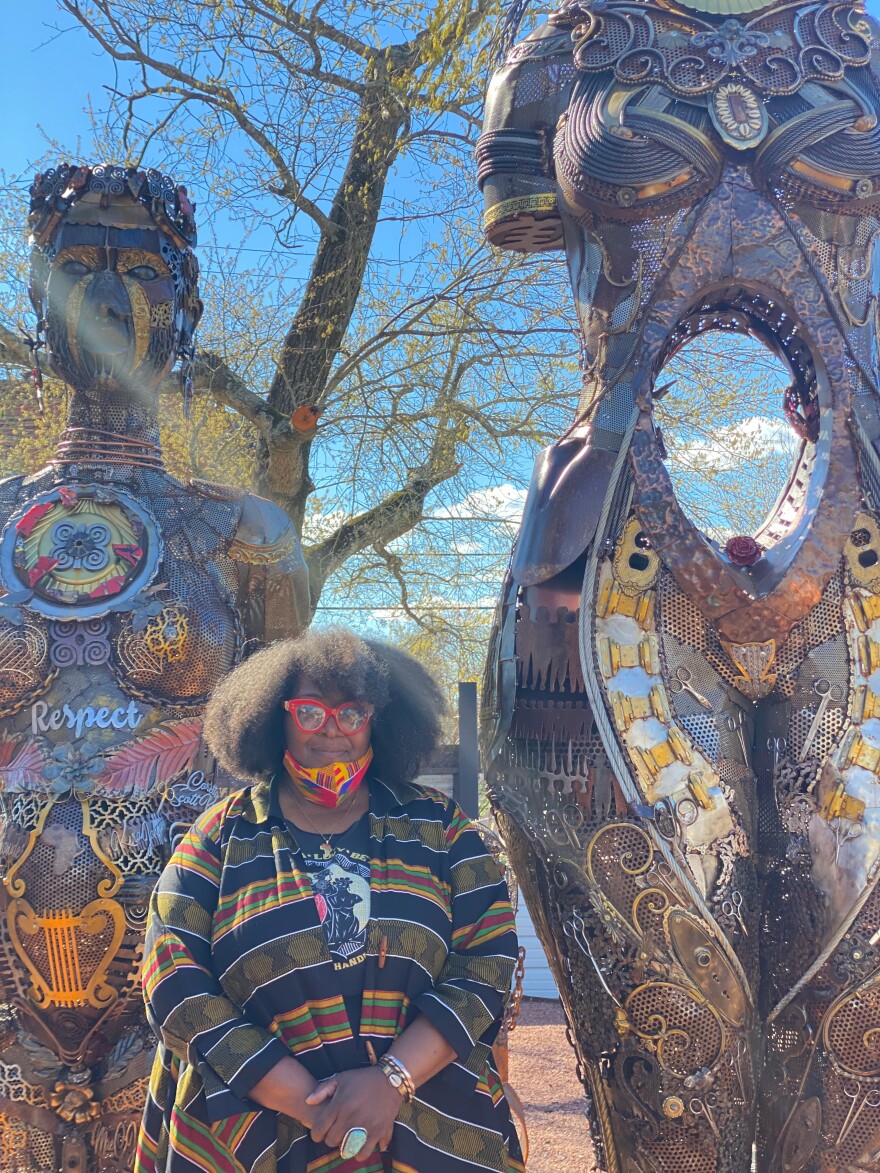Birth professionals from around the country gathered in Montgomery, Ala., to heal, to learn and to honor the lives and sacrifices of three women: Anarcha, Lucy, and Betsey, the Mothers of Gynecology.
These towering mothers built of scrap metal were the cornerstone of a two-day conference in late February centered on Black maternal health inside Old Ship A.M.E Zion Church.
"There's so much that people don't know about," says Dr. Veronica Maria Pimentel, an obstetrician gynecologist based in Hartford, Ct., who began a petition two years ago asking those in her field to recognize the contributions of Anarcha, Lucy and Betsey.
"The history is told from the point of view of those in power and those who were in power were men and those who were in power were also white," she says. "And we're talking about women, we're talking specifically about Black women, and we're talking about enslaved Black women. So it is important for us to go back and look at this history because the history informs what we're doing today when we talk about inequalities in health care."
Local artist Michelle Browder has thought about the Mothers of Gynecology since she was 18. That's when she learned of a white doctor named J. Marion Sims, who experimented on the bodies of enslaved Black women without offering any pain relief. He claimed to have cured them of ailments that arose from pregnancy.
Browder built the massive sculptures from donated metal on land her family owns, a response to the statue of Sims that sits a few miles away. She dedicated this public monument to every mother who ever lost a child. Welded to the metal bodies are names like Serena Williams and words like beauty and resilience. African beads adorn their necks. Browder took the tool Sims invented — the speculum — and created a tiara for Betsey.

"They were birthed out of pain, but also because I wanted to change the narrative," Browder says. "I wanted to change the conversation about Black women in this country and what we have to contribute and the infant mortality rate, reproductive justice and maternal health. We are in a crisis. And we're hoping to elevate the conversation."
She led a group in song as they walked to the park. They gathered in a circle around the mothers.
"All of these women are bigger than life for me," Browder says. "Anarcha is 15 feet tall. Betsy is about ... 12 and Lucy is 9 feet tall."
Anarcha's hips are crafted from the spades of shovels. She faces the sky, defiant and hopeful. At the center of her body, her womb is a chasm for the world to see. That was Deborah Shedrick's responsibility. She helped construct all three, but Anarcha's womb "was her baby."
"All of my feelings went into that piece," Shedrick says. "I wanted it to encompass their spiritual pain, the mental pain, their physical pain."
Visitors place flowers at the feet of the sculptures. This is, after all, what doulas and midwives do. They protect mothers.
"We see our clients in this art," says Denise Bolds, president of Doulas of North America or DONA International. "We see the losses, we see the victories, we see the ones that make it just by the skin of our teeth and we see the fear. It's all here, it's all here, it's all here."
The goal is always to empower families. Black mothers die in childbirth at disproportionate rates and are three to four times more likely to suffer complications during pregnancy.
"I had a mother message me this morning," says Ravae Sinclair, former president of DONA International. "She [tells me,] 'I have seven days [unti] my expected due date.' And I said, 'You made it and you will continue to make it.' She's with us because she's afraid to die. And I said not on our watch."

The group was brought to the place where these experiments occurred. They listened to Deirdre Cooper Owens, a historian of U.S. slavery medicine, describe how this legacy of medical racism persists. Though these women's bodies literally allow for the United States to be placed on a global medical map, they aren't acknowledged. They are erased from their own life experience, Owens says.
"And so the embodied experiences of the legacy of medical racism is that we're not believed," Cooper Owens says. "And we're thought to be able to withstand pain more. We're thought to be over dependent on either government assistance or narcotics. We're sexually irresponsible. We're blamed when there are negative medical outcomes. And class doesn't protect you. Education doesn't protect you, your relationship status doesn't protect you."
One of the last speakers was Charles Johnson, an Atlanta-based father who began the nonprofit 4Kira4Moms after the loss of his wife from hemorrhage following the birth of their second son. In 2018, Johnson worked with lawmakers to pass the Preventing Maternal Deaths Act, which provides funding to better investigate and review incidents of maternal mortality.
"As we work to protect women and babies and put an end to the maternal mortality crisis, it's also equally as important, if not more, important that we protect our history and that these stories are told," Johnson says.
There's a line Michelle Browder uses for the Mothers of Gynecology. It's from the playwright Ntozake Shange's work "For Colored Girls Who Have Considered Suicide / When the Rainbow is Enuf." It reads: "Let her be born / Let her be born & handled warmly."
Copyright 2022 WBUR


